四川省成都市龙泉中学2016-2017学年高二英语10月月考试题
四川省成都市高二英语10月月考试题(3)
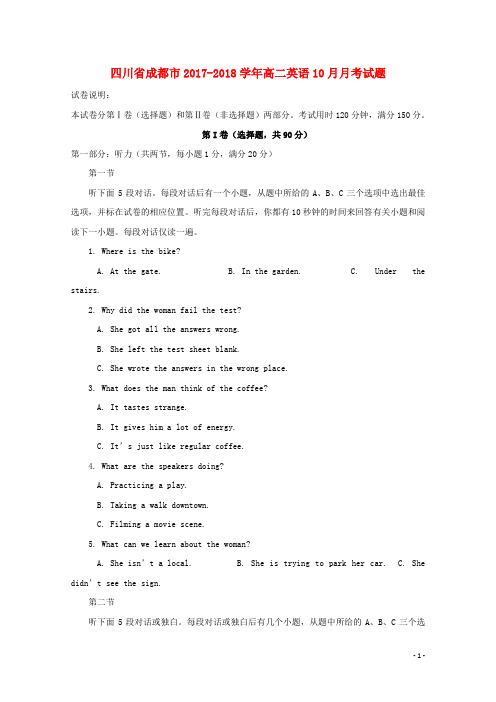
四川省成都市2017-2018学年高二英语10月月考试题试卷说明:本试卷分第Ⅰ卷(选择题)和第Ⅱ卷(非选择题)两部分。
考试用时120分钟,满分150分。
第I卷(选择题,共90分)第一部分:听力(共两节,每小题1分,满分20分)第一节听下面5段对话。
每段对话后有一个小题,从题中所给的A、B、C三个选项中选出最佳选项,并标在试卷的相应位置。
听完每段对话后,你都有10秒钟的时间来回答有关小题和阅读下一小题。
每段对话仅读一遍。
1. Where is the bike?A. At the gate.B. In the garden.C. Under the stairs.2. Why did the woman fail the test?A. She got all the answers wrong.B. She left the test sheet blank.C. She wrote the answers in the wrong place.3. What does the man think of the coffee?A. It tastes strange.B. It gives him a lot of energy.C. It’s just like regular coffee.4. What are the speakers doing?A. Practicing a play.B. Taking a walk downtown.C. Filming a movie scene.5. What can we learn about the woman?A. She isn’t a local.B. She is trying to park her car.C. She didn’t see the sign.第二节听下面5段对话或独白。
每段对话或独白后有几个小题,从题中所给的A、B、C三个选项中选出最佳选项,并标在试卷的相应位置。
四川省成都市2015_2016学年高二英语上学期10月阶段性考试试题
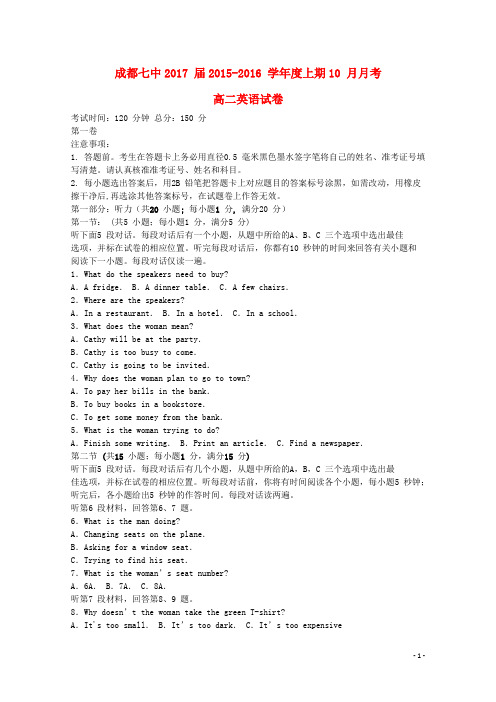
成都七中2017 届2015-2016 学年度上期10 月月考高二英语试卷考试时间:120 分钟总分:150 分第一卷注意事项:1. 答题前。
考生在答题卡上务必用直径0.5 毫米黑色墨水签字笔将自己的姓名、准考证号填写清楚。
请认真核准准考证号、姓名和科目。
2. 每小题选出答案后,用2B 铅笔把答题卡上对应题目的答案标号涂黑,如需改动,用橡皮擦干净后,再选涂其他答案标号,在试题卷上作答无效。
第一部分:听力(共20 小题; 每小题1 分, 满分20 分)第一节: (共5 小题;每小题1 分,满分5 分)听下面5 段对话。
每段对话后有一个小题,从题中所给的A、B、C 三个选项中选出最佳选项,并标在试卷的相应位置。
听完每段对话后,你都有10 秒钟的时间来回答有关小题和阅读下一小题。
每段对话仅读一遍。
1.What do the speakers need to buy?A.A fridge. B.A dinner table. C.A few chairs.2.Where are the speakers?A.In a restaurant. B.In a hotel. C.In a school.3.What does the woman mean?A.Cathy will be at the party.B.Cathy is too busy to come.C.Cathy is going to be invited.4.Why does the woman plan to go to town?A.To pay her bills in the bank.B.To buy books in a bookstore.C.To get some money from the bank.5.What is the woman trying to do?A.Finish some writing. B.Print an article. C.Find a newspaper.第二节(共15 小题;每小题1 分,满分15 分)听下面5 段对话。
四川省高二英语10月月考试题(含解析)
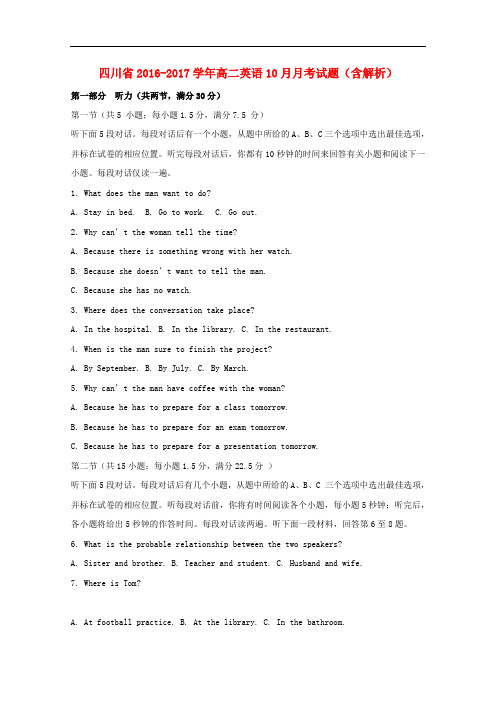
四川省2016-2017学年高二英语10月月考试题(含解析)第一部分听力(共两节,满分30分)第一节(共5 小题;每小题1.5分,满分7.5 分)听下面5段对话。
每段对话后有一个小题,从题中所给的A、B、C三个选项中选出最佳选项,并标在试卷的相应位置。
听完每段对话后,你都有10秒钟的时间来回答有关小题和阅读下一小题。
每段对话仅读一遍。
1. What does the man want to do?A. Stay in bed.B. Go to work.C. Go out.2. Why can’t the woman tell the time?A. Because there is something wrong with her watch.B. Because she doesn’t want to tell the man.C. Because she has no watch.3. Where does the conversation take place?A. In the hospital.B. In the library.C. In the restaurant.4. When is the man sure to finish the project?A. By September.B. By July.C. By March.5. Why can’t the man have coffee with the woman?A. Because he has to prepare for a class tomorrow.B. Because he has to prepare for an exam tomorrow.C. Because he has to prepare for a presentation tomorrow.第二节(共15小题;每小题1.5分,满分22.5分)听下面5段对话。
四川省成都市高二英语10月月考试题

2017---2018学年度上期10月考试高二英语试卷注意事项:1. 答题前,先将自己的姓名、准考证号填写在试题卷和答题卡上,并将准考证号条形码粘贴在答题卡上的指定位置。
2. 选择题的作答:每小题选出答案后,用2B铅笔把答题卡上对应题目的答案标号涂黑,写在试题卷、草稿纸和答题卡上的非答题区域均无效。
3. 非选择题的作答:用签字笔直接答在答题卡上对应的答题区域内。
写在试题卷、草稿纸和答题卡上的非答题区域均无效。
4. 考试结束后,请将本试题卷和答题卡一并上交。
第Ⅰ卷(选择题共70分)第一部分阅读理解(共两节,满分40分)第一节(共15小题;每小题2分,满分30分)阅读下列短文,从每题所给的四个选项(A、B、C和D)中选出最佳选项,并在答题卡上将该项涂黑。
AAfrican SafariEssential information you need to know before booking your African Safari in Southern Africa – These tips will enhance the experience that you have.Things to Consider Before Booking an African Safari1) Book in AdvanceAfrican Safaris are now hugely popular and good safari camps often get booked out more than a year in advance, especially during the high season from July through to October.2) Choosing which game parkDifferent parks have different topography and weather patterns – this greatly affects animal movements at different times of the year. If you want to target certain species of animals, then some parks are better than others for certain species.3)Choosing which lodge or safari campA typical safari camp has between 10 and 20 beds, it is an intimate safari experience and very personalized. However, there are also hotels in some places, either inside or just outside a national park, which can sleep anything up to 300 people.4)GuidingThe quality, experience and knowledge of the game at any Safari camp is almost the most important factor to consider. Good guides can transform your experience from ordinary to exceptional.5)What’s the Best Time of Year to go on SafariUnderstandably as the seasons change so does the safari experience. It is highly advisable to find out the best time of year for the safari area that you are intending to visit. Prices will change dramatically between the high and the low season, so good deals are to be had in the low season but it is important to know the difference, as your experience will be vastly different.6)The PriceGoing on safari is not cheap whichever way you do it, but the price range can be enormous. Unfortunately, safaris in most cases are a case of “you pay for what you get”.7)Fly-in safari or notUsing small charter planes is sometimes an absolute necessity for camps in remote areas, where road transfers are just not practical or viable. These flights can increase the overall cost of the safari substantially but generally they are worth it and allow you the flexibility to visit a variety of safari camps in different locations.8)Use an AgentAs you can see from all the information and options detailed above, there is great deal to understand and unless you go on safari several times a year it is impossible to know all this stuff.CONTACT US NOW TO HELP PLAN YOUR SAFARIWe are qualified travel agents who know this area intimately!Click on the below buttons for some fantastic safari ideas1. Which is a determining factor in choosing a Safari camp?A. Means of transport.B. Weather patterns.C. Game guides.D. Accommodation.2.Which of the following is FALSE about African Safari?A. The more money you pay, the better experience you’ll get.B. You can have a good price but same experience if you travel in low season.C. If you visit different camps in remote areas, flights may be unavoidable.D. All the parks don’t have the same species of animals.BHow many things can you see in the night sky? A lot! On a clear night you might see the Moon, some planets, and thousands of sparkling stars.You can see even more with a telescope. You might see stars where before you only saw dark space. You might see that many stars look larger than others. You might see that some stars that look white are really red or blue. With bigger and bigger telescopes you can see more and more objects in the sky. And you can see those objects in more and more detail.But scientists believe there are some things in the sky that we will never see. We won’t see them with the biggest telescope in the world, on the clearest night of the year.That’s because they’re invisible. They’re the mysterious dead stars called black holes.You might find it hard to imagine that stars die. After all, our Sun is a star. Year after year we see it up in the sky, burning brightly, giving us heat and light. The Sun certainly doesn’t seem to be getting old or weak. But stars do burn out and die after billions of years.As a star’s gases burn, they give off light and heat. But when the gas runs out, the star stops burning and begins to die.As the star cools, the outer layers of the star pull in toward the center. The star squashes into a smaller and smaller ball. If the star was very small, the star ends up as a cold, dark ball called a black dwarf. If the star was very big, it keeps squashing inward until it’s packed together tighter than anything in the universe.Imagine if the Earth were crushed until it was the size of a tiny marble. That’s how tightly this dead star, a black hole, is packed. What pulls the star in toward its ce nter with such power? It’s the same force that pulls you down when you jump –the force called gravity. A black hole is so tightly packed that its gravity sucks in everything – even light. The light from a black hole can never come back to your eyes. That’s why you see nothing but blackness.So the next time you stare up at the night sky, remember: there’s more in the sky than meets the eye! Scattered in the silent darkness are black holes –the great mystery of space.3. According to the article, what causes a star to die?A. As it gets hotter and hotter, it explodes.B. It collides with other stars.C. It can only live for about a million years.D. As its gases run out, it cools down.4. Which of the following statements is NOT a fact?A. Black holes are dead stars.B. There is nothing as mysterious as a black hole.C. Black holes are invisible.D. Black holes have gravity.5.Which of the following is NOT a feature of a black dwarf?A. It is usually bigger than a white dwarf.B. It is dark.C. It is smaller in size than a common star.D. It is cold.6. Why can’t you see light when you look at a black hole?A. For most black holes are so far away.B. As the star’s gases burn, it stops giving off heat and light.C. As a star cools, its outer layers pull in toward its center.D. The gravity of a black hole is so strong that it sucks the light inward.CIn life, we will succeed and fail often for reasons that are entirely out of our control. For instance, we can be incredibly nice and love someone deeply, and they may not love us back. We can work harder than anyone else in the office and still not be promoted to management. We can eat healthy food, exercise and stay away from alcohol and cigarettes, and still get sick.The bottom line is that life is not fair.That is a tough pill to swallow for many of us. As a result, some people shut down after being hit by even one unfair blow from life. They can’t handle the fact that our efforts don’t always get the results that we expect. But if we let life’s unfairness defeat us, we will never receive the beautiful blessings (幸事) that life has in store for us.For example, my first marriage ended in divorce. To me, it felt very unfair.I had worked hard to be a good wife and mother. However, no matter what I did, I could not make the relationship work.I could have been shut down by that experience. I could have decided that if one person didn’t appreciate me as a wife, then no one would. I could have given up. But I knew that I wanted to be married. I knew that I wanted to experience traditional family life. So I didn’t let one seemingly unfair experience stop me from believing that I could one day be happily married. And then one day, I met this kind, thoughtful, generous man with whom I now have a wonderful friendship and marriage. But that wouldn’t have happened if I had decided to give up after one failed marriage.What I’ve learned over the years is that we can do all the things that deserve a good outcome, but get bad things in return instead.When we are faced with lif e’s seeming unfairness, our faith needs to jump in. When life doesn’t go according to plan, we have to let go of the outcome that we are looking forward to and keep trying, working hard and doing the right thing. Please don’t be discouraged. Accept that li fe is neither fair nor straightforward. And by knowing that if we remain confident, we can drive our unfair experiences away and use them for our benefit.7. We can learn from the first three paragraphs that ______.A. life doesn’t often turn out the way we expectB. the author thinks life should reward us for our effortsC. unsatisfactory results simply mean your effort is not enoughD. people should focus on the process rather than the outcomes8. The author wrote about her unsuccessful marriage to ______.A. complain about the unfairness of her life and marriageB. tell readers how she met her second husband and became happily marriedC. express how proud she is for not being shut down by a blow from lifeD. show that we need to have faith and continue working for our goals9. When we encounter unfairness in life, the author suggests we ______.a. do nothing but accept themb. be confident with ourselvesc. keep doing what we should dod. find out what has gone wrongA. abB. adC. bcD. cd10. The author wrote the article mainly to ______.A. share her experiences of unfairness in lifeB. tell us how to deal with life’s seeming unfairnessC. tell us that life has beautiful blessings in store for usD. explain why life seems neither fair nor straightforwardDAmericans are not famous for self-deprivation(剥夺), but experts say we consistently fail to get a good night's sleep. The recommended daily requirements should sound familiar: eight hours of sleep a night for adults and at least an hour more for adolescents. Yet 71 % of American adults and 85% of teens do not get the suggested amount. “Sleep is sort of like food.”says Robert Stickgold, a cognitive (认知的)neuroscientist at Harvard Medical School But, he adds,there's one important difference: “You can be quite starved and still alive, and I think we appre ciate how horrible that must be. But many of us live on the edge of sleep starvation and just accept it”Part of the problem is that we are so used to being sleep deprived and coping with that condition that we no longer notice how exhausted we really are. In 2003, sleep expert David Dinges at the University of Pennsylvania School of Medicine tested the effects of restricting sleep to eight, six, or four hours a night for two weeks. During the first few days, subjects sleeping less than eight hours admitted to being tired and lacking alertness. But by Day 4, most people had adapted to their new baseline sleepiness and reported feeling fine—even as their cognitive performance continued to decline- Over time, they became so exhausted that they had difficulty concentrating on even the simplest tasks. “The human brai n works only capable of about sixteen hours of wakefulness a day,” says Dinges. “When you get beyond that, it can't function as efficiently accurately or well.”In the real worlds people overcome their sleepiness by drinking coffee or taking a walk. But then they find themselves nodding off in meetings or worse, behind the wheel, Those short snatches of unconsciousness are what researchers call microsleep, a sure sign of sleep deprivation, “If people are falling asleep because ‘the office was hot' or ‘the meeting was boring, 'that's not coping with sleep loss. I would argue that they're affecting their productive capability, says Dinges.What most people don't realize is that the purpose of sleep may be more to rest the mind than to rest the body. Sleep helps strengthen memory, improve judgment, promote learning and concentration, boost mood, speed reaction time and sharpen problem solving and accuracy. According to Sonia Ancoli-Israel, a psychologist at the University of California who’s done extensive studies in the aging population, lack of sleep may even resemble the symptoms of dementia (痴呆). In recent findings, she was able to improve cognitive function in patients with mild to moderate Alzheimer's simply by treating their sleep disorder. “The need for sleep does not change a lot with age,” says Ancoli-Israel, but often because of illnesses and the medications, “the ability to sleep does.”If you lack sleep, there’s plenty you can do to pay back your sleep debt. For starters,take your mom's advice, and get to bed early. If you can’t manage to sleep longer at night, try to squeeze in a midday nap. Timothy Roehrs, director of research at the sleep Disorders and Research Center at Henry Ford Hospital advises against oversleeping on weekend mornings to make up for a workweek of deprivation; later rising can make it even harder later to get a full night s rest.According to Dinges, the most common reason we deprive ourselves of sleep is work. But consider that in giving up two hours of bedtime to do more work, you are losing a quarter of your recommended nightly sleep and gaining just 12% more time during the day. What if you could be 12% more productive instead? If mental sharpness is your goal, the answer is clear: stop depriving yourself, and get a good night's sleep.11. We can learn from Dinges' experiment that .A. people tend to ignore the decline in mental sharpnessB. people get easily used to lack of sleep in less than 4 daysC. sleeping less than 8 hours won't cause physical discomfortD. people can keep themselves awake for only sixteen hours12. In Paragraph 3, the author shows that a person who is sleep deprived .A. remains productive by drinking coffee or taking a walkB. fails to cope with sleep loss through nodding offC. engages in microsleep to maintain productivityD. fells asleep due to the high temperature and boredom13. According to psychologist Sonia Ancoli-Israel, .A. the elderly don't need as much sleep as they used toB. the ability to sleep is not affected by medicationsC. sleep deprivation may look like the symptoms of dementiaD. people wi th Alzheimer’s cannot be treated for sleep disorders14. What's the author's attitude to people’s acceptance of sleep deprivation?A. Supportive.B. AmbiguousC. CautiousD. Worried15. What is the author’s purpose in writing this article?A. To explain the reasons why people accept sleep starvation.B. To urge people to catch up on lost time for a good night's sleep.C. To show the common phenomenon of sleep loss in America,D. To raise people’s awareness of the hidden sleep deprivation.第二节(共5小题;每题2分,满分10分)根据短文内容,从短文后的选项中选出能填入空白处的最佳选项。
四川省成都市龙泉第二中学2016-2017学年高高二入学考试英语试题 含答案
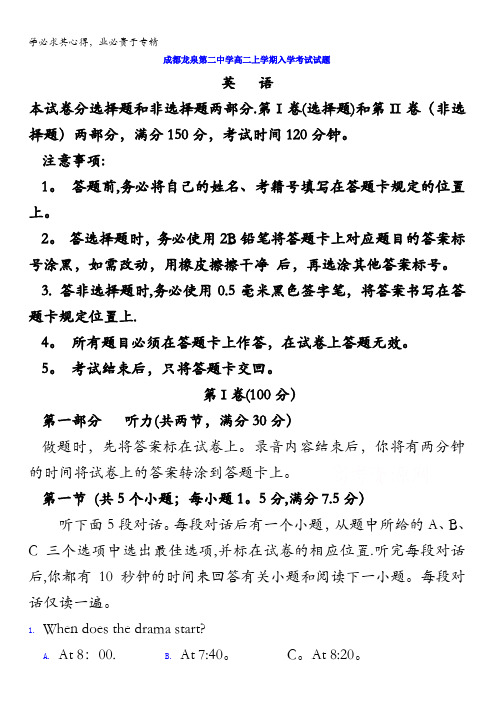
成都龙泉第二中学高二上学期入学考试试题英语本试卷分选择题和非选择题两部分.第I卷(选择题)和第II卷(非选择题)两部分,满分150分,考试时间120分钟。
注意事项:1。
答题前,务必将自己的姓名、考籍号填写在答题卡规定的位置上。
2。
答选择题时,务必使用2B铅笔将答题卡上对应题目的答案标号涂黑,如需改动,用橡皮擦擦干净后,再选涂其他答案标号。
3. 答非选择题时,务必使用0.5毫米黑色签字笔,将答案书写在答题卡规定位置上.4。
所有题目必须在答题卡上作答,在试卷上答题无效。
5。
考试结束后,只将答题卡交回。
第I卷(100分)第一部分听力(共两节,满分30分)做题时,先将答案标在试卷上。
录音内容结束后,你将有两分钟的时间将试卷上的答案转涂到答题卡上。
第一节(共5个小题;每小题1。
5分,满分7.5分)听下面5段对话。
每段对话后有一个小题,从题中所给的A、B、C三个选项中选出最佳选项,并标在试卷的相应位置.听完每段对话后,你都有10秒钟的时间来回答有关小题和阅读下一小题。
每段对话仅读一遍。
1.When does the drama start?A.At 8:00.B.At 7:40。
C。
At 8:20。
2.What will the man have for breakfast?A.Eggs。
B.Bread.k。
3.What's the relationship between the speakers?A。
Teacher and student。
B。
Doctor andpatient.C. Shop owner andcustomer.4.Who is probably the woman?A.A restaurantwaitress。
B.A hotel clerk。
C.A librarian。
5.What kind of music does the man like better?A.Rock music.B.Light music.C。
四川省成都外国语学校2016-2017学年高二上学期10月月考试题 英语 Word版含答案
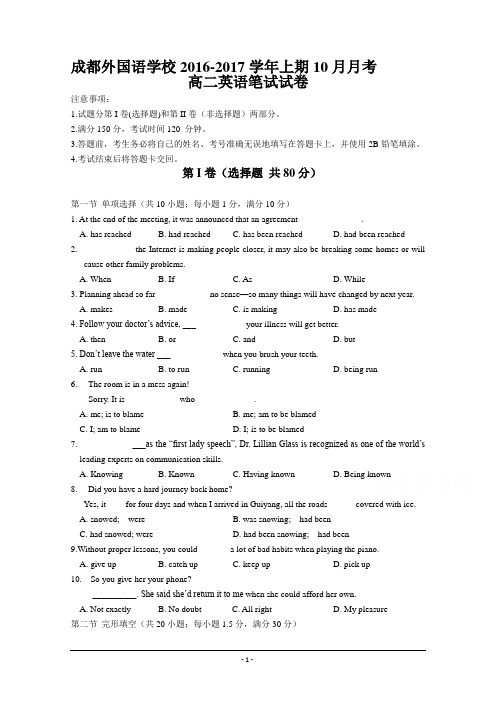
成都外国语学校2016-2017学年上期10月月考高二英语笔试试卷注意事项:1.试题分第I卷(选择题)和第II卷(非选择题)两部分。
2.满分150分,考试时间120 分钟。
3.答题前,考生务必将自己的姓名、考号准确无误地填写在答题卡上,并使用2B铅笔填涂。
4.考试结束后将答题卡交回。
第I卷(选择题共80分)第一节单项选择(共10小题;每小题1分,满分10分)1. At the end of the meeting, it was announced that an agreement ______________.A. has reachedB. had reachedC. has been reachedD. had been reached2. ____________ the Internet is making people closer, it may also be breaking some homes or willcause other family problems.A. WhenB. IfC. AsD. While3. Planning ahead so far ____________no sense—so many things will have changed by next year.A. makesB. madeC. is makingD. has made4. Follow your doctor’s advice, ______________ your illness will get better.A. thenB. orC. andD. but5. Don’t leave the water _______________when you brush your teeth.A. runB. to runC. runningD. being run6. ---The room is in a mess again!---Sorry. It is ____________who _____________.A. me; is to blameB. me; am to be blamedC. I; am to blameD. I; is to be blamed7. _______________as the “first lady speech”, Dr. Lillian Glass is recognized as one of the world’s leading experts on communication skills.A. KnowingB. KnownC. Having knownD. Being known8. ---Did you have a hard journey back home?---Yes, it ____for four days and when I arrived in Guiyang, all the roads ______covered with ice.A. snowed; wereB. was snowing; had beenC. had snowed; wereD. had been snowing; had been9.Without proper lessons, you could _______a lot of bad habits when playing the piano.A. give upB. catch upC. keep upD. pick up10.---So you give her your phone?---__________. She said she’d return it to me when she could afford her own.A. Not exactlyB. No doubtC. All rightD. My pleasure第二节完形填空(共20小题;每小题1.5分,满分30分)Big things were happening in my life in the summer after I turned 13.In the middle of that summer,my parents __11__ my entire world when they told me they were getting a divorce. I couldn't believe that our family was going to __12__.Though I always knew my parents weren't very happy and they often fought,I still wanted my family to stay __13__.My life changed completely after the divorce. My mother and I moved into a small apartment __14__ town,while my father and brother,Bill,stayed in our house. I became a visitor __15__ I went to see my dad and Bill on the weekends. And immediately I had my stepfather,Dan,__16__ I showed no interest in. I was clearly sad,especially after Dan and my mother married __17__I realized that there was no way that things could change __18__ the way they were.Even though I refused all Dan's trying to get to know me and wasn't very nice to him,he never gave __19__ on me. Gradually,I began to trust him. I realized that we actually had some things in common,especially when __20__ came to movies and TV shows. We spent a lot of time together __21__ out to watch movies. That gave us a chance to talk and get to know each other__22__.Better still,Dan showed an interest in me that I had __23__experienced from my own father. Dan was always around when I needed __24__ on school or friends. Once I began to __25__ Dan,the three of us began spending a lot of time together. We often went out to eat and __26__ short trips. Eventually,I discovered that I finally had the happy family that I had always __27__.I now realize my parents were __28__ about getting the divorce. Their breakup was the best thing to happen for all of us. My father also found happiness—he __29__ and had another child,my half-sister,Michelle.At 13,I __30__ an important truth—change is not always the worst thing that can happen. Sometimes,it is just what we need the most.11.A. shook B.broke C.destroyed D.changed 12.A. break down B.break up C.break in D.break out 13.A. a same B.same C.the same D.at same 14.A. at B.from C.across D.over15.A. when B.while C.that D.whenever 16.A. whoever B.which C.whom D.that17.A. but B.and C.however D.also18.A. back B.back to C.into D.for19.A. up B.in C.out D.off20.A. that B.it C.he D.we21.A. go B.went C.to go D.going22.A. more deeply B.much deeply C.more deeper D.very deeper 23.A. either B.too C.before D.never24.A. suggestion B.advices C.advice D.tip25.A. receive B.accept C.recognize D.know26.A. went B.began C.took D.go for 27.A. wished B.hoped C.dreamed D.wanted 28.A. right B.wrong C.necessary D.good29.A. divorced B.united C.married D.remarried 30.A. found B.discover C.learned D.understand第三节阅读理解(共15小题;每小题2分,满分30分)AWhich boy hasn’t dreamed of being a cool secret agent(特工)? The wonderful fighting abilities and the world-saving adventures are much more colourful than most people’s everyday lives. Well, Cody Banks is just like any other boy, except that he is not just dreaming. He has a big secret his friends never know about. He was trained to be a spy(间谍)by a special CIA programme, which was made to look like a summer camp. He learned high-speed driving, hand-to-hand fighting and the use of high-tech tools.After proving he could become a young hero by saving a baby from a runaway car, Banks gets his first real task. He must make friends with a popular girl at school, Natalie Connors. Then, he must spy on her father, a scientist who has developed a dangerous technology(技术). Banks must stop a group of bad peop le from forcing Natalie’s father into using the technology to endanger the world.The CIA may have taught him first-class self-defence moves, but they didn’t show him how to talk to girls. Banks has zero ability when it comes to dealing with girls. How can he get around his problem and get an invitation to the girl’s upcoming birthday party? Will he finally become Natalie’s boyfriend and find out whatever he can about her father’s work?Agent Cody Banks has everything that young people are interested in: big explosions, breathtaking performances and funny girl-dating experiences. It was listed No.2 in the American box office last week."This story is interesting and fun for the whole family to enjoy, and especially cool for young boys." said Paul Perkins, a film reviewer in the US.31.Banks wanted to go to Natalie’s birthday party to .A. meet her fatherB. know more peopleC. make friends with herD. steal some information32.What is considered as a great danger in the text?A. The technology developed by Natalie’s father.B. An explosion set off by some bad people.C. The CIA’s training of boys for its tasks.D. Secret agents’ spying on scientists.33.What is the purpose of the text?A. Making known the work of the CIA.B. Telling the story about a cool boy.C. Showing the dark side of science.D. Introducing a new film.BOf course, Ms Cratty wasn’t really my aunt and, out of fear, I never called her that to her face. I only called her "My Aunt Fannie" because the name always made my father chuckle (轻声地笑) and caused my mother to look seriously at both of us — at me for being disrespectful of my elder, and at my father for encouraging my bad behavior. I enjoyed both reactions so I looked for every opportunity to work the name into as many conversations as possible.As a young woman, my mother had worked in the kitchen of a large farmhouse owned by Ms Cratty and her twin brother. Neither had married, and they had had no children. My father once told me that it was because they were both too mean to share their fami ly’s money or pass it on. Ms Cratty was famous for her blueberry jam and for never sharing the recipe with another one. Even though my mother knew the recipe, she never made the jam without Ms Cratty to direct the process and keep the secret.Each August, my mother would prepare me for Aunt Fannie’s visit. One year, after I had been particularly helpful with the jam process Aunt Fannie gave me a quarter and then made me promise that I would never spend it. "Hold onto this quarter," she said, "and someday you will be rich. I still have my very first quarter, given to me by my grandfather." It had obviously worked for her. So, I put the quarter in my dresser drawer, and waited to become rich.I now have the jam recipe and the quarter from Aunt Fannie. Neither has made me wealthy, but I keep them as reminders to hold onto the valuable things in life. Money can make you feel rich for a while, but it is the relationships and the memories of time spent with friends and family that truly leave you wealthy. And that is a fortune that anyone can build.34.Why did the author prefer to call Aunt Fannie "My Aunt Fannie"?A. Because she wanted to show respect for her.B. Because she believed that made her seem closer to her.C. Because she loved to see her parents’ responses to it.D. Because she didn’t like h er and thus made fun of her.35.According to the second paragraph, the author’s mother.A. owned the large farmhouse with Aunt FannieB. disliked Aunt Fannie’s meanness and the way she would never shareC. didn’t know the exact way to make the jamD. tried to make Aunt Fannie believe that the secret recipe was safe36.The author used to believe that the quarter given to her by Aunt Fannie .A. was a reminder of the valuable things in her lifeB. would bring her good luck and make her richC. was a small reward for her help with the jam processD. was the exact one that Aunt Fannie had received from her grandfather37.The author thinks that we can feel wealthy if we .A. have a certain secret recipeB. have lasting love and friendshipC. share our wealth with othersD. have good fortune and moneyCReading poems is not exactly an everyday activity for most people. In fact, many people never read a poem once they get out of high school.It is worth reminding ourselves that this has not always been the case in America. In the nineteenth century, a usual American activity was to sit around the fireside in the evening and read poems aloud. It is true that there was no television at the time, nor movie theaters, nor World Wide Web, to provide diversion. However, poems were a source of pleasure, of self-education, of connection to other people or to the world beyond one’s own community. Reading them was a social act as well as an individual one, and perhaps even more social than individual. Writing poems to share with friends and relations was, like reading poems by the fireside, another way in which poetry has a place in everyday life.How did things change? Why are most Americans no longer comfortable with poetry, and why do most people today think that a poem has nothing to tell them and that they can do well without poems?There are, I believe, three culprits(引起问题的事物): poets, teachers, and we ourselves. Of these, the least important is the third: the world surrounding the poem has betrayed(背叛) us more than we have betrayed the poem. Early in the twentieth century, poetry in English headed into directions unfavorable to the reading of poetry. Readers decided that poems were not for the fireside or the easy chair at night, that they belonged where other difficult-to-read things belonged.Poets failed the reader, and so did teachers. They want their students to know something about the skills of a poem, and they want their students to see that poems mean something. Yet what usually occurs when teachers push these concerns on their high school students is that young people decide poems are unpleasant crossword puzzles.38.Reading poems is thought to be a social act in the nineteenth century because .A. it built a link among peopleB. it helped unite a communityC. it was a source of self-educationD. it was a source of pleasure39.The underlined word "diversion"(in Paragraph 2) most probably means "_______".A. concentrationB. changeC. amusementsD. stories40.According to the passage, what is the main cause of the great gap between readers and poetry?A. Students are becoming less interested in poetry.B. Students are poorly educated in high school. and the Internet are more attractive than poetry.D. Poems have become difficult to understand.41.In the last paragraph, the writer questions .A. the difficulty in studying poemsB. the way poems are taught in schoolC. students’ wrong ideas about poetryD. the techniques used in writing poemsDF eeling tired lately? Has the doctor said he could not find anything wrong with you? Perhaps he sent you to a hospital, but all the advanced equipment there shows that there is nothing wrong. Then consider this, you might be in a state of subhealth(亚健康).Subhealth, also called the third state or grey state, is explained as a border line state between health and disease. According to an investigation(调查)by the National Health Organization, over 45 percent of subhealthy people are middle-aged or elderly. The percentage is even higher among people who work in management positions as well as students around exam time.Symptoms(症状)include a lack of energy, depression, slow reactions, insomnia(失眠), agitation(焦虑), and poor memory. Other symptoms include shortness of breath, sweating(出汗)and aching in the waist and legs.The key to preventing and recovering from subhealth, according to some medical experts, is to form good living habits, alternate work with rest, exercise regularly, and take part in open-air activities.As for meals, people are advised to eat less salt and sugar. They should also eat more fresh vegetables, fruits, fish because they are rich in nutritional(营养的)elements—vitamins and trace elements(微量元素)—that are important to the body.Nutrition experts point out that it is not good to eat too much at one meal because it may cause unhealthy changes in the digestive tract(消化道). They also say that a balanced diet is very helpful in avoiding subhealth.42. According to this passage, which of the following is right?A. When you are in a state of subhealth, you should stay home and keep silent.B. When you are in a state of subhealth, you should go to see a doctor and buy some medicine.C. When you are in a state of subhealth, you should have yourself examined in foreign countries.D. When you are in a state of subhealth, you should find out the reasons and relax yourself.43. Middle-aged people may feel subhealthy, because _______.A. they have used up their energyB. they have lost their living hopesC. they have more pressure in life and workD. begin to get older44. The answer of preventing you falling into a state of subhealth is that you should _______.A. work hardB. sleep moreC. form good living habitD. take more medicine45. As for food, experts suggest that ________.A. we should never eat meatB. we should have a variety of foodC. we should eat less than usualD. we should have meals without salt or sugar第四节阅读理解七选五。
四川省成都市龙泉中学2016-2017学年高二10月月考语文
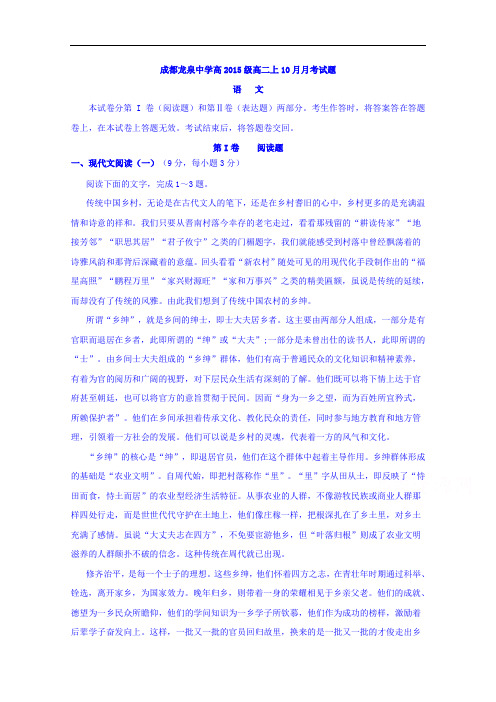
成都龙泉中学高2015级高二上10月月考试题语文本试卷分第I卷(阅读题)和第Ⅱ卷(表达题)两部分。
考生作答时,将答案答在答题卷上,在本试卷上答题无效。
考试结束后,将答题卷交回。
第I卷阅读题一、现代文阅读(一)(9分,每小题3分)阅读下面的文字,完成1~3题。
传统中国乡村,无论是在古代文人的笔下,还是在乡村耆旧的心中,乡村更多的是充满温情和诗意的祥和。
我们只要从晋南村落今幸存的老宅走过,看看那残留的“耕读传家”“地接芳邻”“职思其居”“君子攸宁”之类的门楣题字,我们就能感受到村落中曾经飘荡着的诗雅风韵和那背后深藏着的意蕴。
回头看看“新农村”随处可见的用现代化手段制作出的“福星高照”“鹏程万里”“家兴财源旺”“家和万事兴”之类的精美匾额,虽说是传统的延续,而却没有了传统的风雅。
由此我们想到了传统中国农村的乡绅。
所谓“乡绅”,就是乡间的绅士,即士大夫居乡者。
这主要由两部分人组成,一部分是有官职而退居在乡者,此即所谓的“绅”或“大夫”;一部分是未曾出仕的读书人,此即所谓的“士”。
由乡间士大夫组成的“乡绅”群体,他们有高于普通民众的文化知识和精神素养,有着为官的阅历和广阔的视野,对下层民众生活有深刻的了解。
他们既可以将下情上达于官府甚至朝廷,也可以将官方的意旨贯彻于民间。
因而“身为一乡之望,而为百姓所宜矜式,所赖保护者”。
他们在乡间承担着传承文化、教化民众的责任,同时参与地方教育和地方管理,引领着一方社会的发展。
他们可以说是乡村的灵魂,代表着一方的风气和文化。
“乡绅”的核心是“绅”,即退居官员,他们在这个群体中起着主导作用。
乡绅群体形成的基础是“农业文明”。
自周代始,即把村落称作“里”。
“里”字从田从土,即反映了“恃田而食,恃土而居”的农业型经济生活特征。
从事农业的人群,不像游牧民族或商业人群那样四处行走,而是世世代代守护在土地上,他们像庄稼一样,把根深扎在了乡土里,对乡土充满了感情。
虽说“大丈夫志在四方”,不免要宦游他乡,但“叶落归根”则成了农业文明滋养的人群颠扑不破的信念。
四川省成都市龙泉20162017学年高二上学期10月月考试题数学理Word版含答案

成都龙泉第二中学高2015级高二上期10月月考试题数学(理).3 B .23 C .33 D .433. 已知一个算法的程序框图如图所示,当输出的结果为21时,则输入的x 值为A .2B .1- C .1-或2 D .1-或10.25πB.50πC.125πD.都不对5.对两条不相交的空间直线a与b,必存在平面α,使得.a⊂α,b⊂α B.a⊂α,b∥α.a⊥α,b⊥α D.a⊂α,b⊥α6.如图所示,一个空间几何体的主视图和左视图都是边长为1的正方形,俯视图是一个直径为1的圆,那么这个几何体的全面积为A. B.2π C.3π D.4π7.设a,b为两条不重合的直线,α,β为两个不重合的平面,下列命题中为真命题的是.若a,b与α所成的角相等,则a∥b.若a ∥α,b ∥β,α∥β,则a ∥b.若a ⊂α,b ⊂β,a ∥b ,则α∥β.若a ⊥α,b ⊥β,α⊥β,则a ⊥b8. 若动点),(),(2211y x B y x A 、分别在直线1l :011=-+y x 和2l :01=-+y x 上移动,则AB 中点M 所在直线方程为A .06=--y xB .06=++y xC .06=+-y xD .06=-+y x9.已知正方体ABCD -A 1B 1C 1D 1中,E 、F 分别为BB 1、CC 1的中点,那么直线AE 与D 1F 所成角的余弦值为 .-45 B. 35 C.34 D .-3510. 如图给出了计算19753++++ 的值的一个程序框图,其中空白处应填入A .9>iB .10>iC .19>iD .20>i11.如右图所示,在四边形ABCD 中,AD ∥BC ,AD =AB ,∠BCD =45°,∠BAD =90°,将△ABD 沿BD 折起,使平面ABD ⊥平面BCD ,构成三棱锥A -BCD ,则在三棱锥A -BCD 中,下列命题正确的是.平面ABD ⊥平面ABC B .平面ADC ⊥平面BDC.平面ABC ⊥平面BDC D .平面ADC ⊥平面ABC12. ,0≠=b a ,且关于x 的方程02=•++a x 有实根,则与夹角的取值范围是A 、⎥⎦⎤⎢⎣⎡60π,B 、⎥⎦⎤⎢⎣⎡ππ,3C 、⎥⎦⎤⎢⎣⎡323ππ,D 、⎥⎦⎤⎢⎣⎡ππ,63.一个直径为32厘米的圆柱形水桶中放入一个铁球,球全部没入水中后,水面升高9厘米则此球的半径为_______厘米.14.如图,在圆心角为直角的扇形OAB中,分别以OA,OB为直径作两个半圆. 在扇形OAB内随机取一点,则此点取自阴影部分的概率是__________________平面α∥平面β,A,C∈α,B,D∈β,直线AB与CD交于点S,且S位于平面α,β之间,AS=8,BS=6,CS=12,则SD=________.16. 单位圆上三点A ,B ,C 满足OA →+OB →+OC →=0,则向量OA →,OB →的夹角为________.17 (本小题满分10分)△ABC 的内角A ,B ,C 的对边分别为a ,b ,c ,已知2cosC (acosB +bcosA )=c . (Ⅰ)求C ;(Ⅱ)若c=,△ABC 的面积为,求△ABC 的周长.18、(本小题满分12分)如图,四棱锥P -ABCD 的底面ABCD 为直角梯形,其中BA ⊥AD ,CD⊥AD ,CD =AD =2AB ,PA ⊥底面ABCD ,E 是PC 的中点.1)求证:BE ∥平面PAD ;2)若AP =2AB ,求证:BE ⊥平面PCD .19. (本小题满分12分)已知圆C :022=++++F Ey Dx y x 的圆心在第二象限,半径为2,且圆C 与直线043=+y x 及y 轴都相切.(1)求F E D 、、;(2)若直线022=+-y x 与圆C 交于B A 、两点,求||AB .20、(本小题满分12分)一个四棱锥的三视图如图所示.1)求证:PA⊥BD;2)在线段PD上是否存在一点Q,使二面角Q-AC-D的平面角为30°?若存在,求|DQ||DP|的值;若不存在,说明理由.21、(本小题满分12分)如图(1)所示,在直角梯形ABCP中,BC∥AP,AB⊥BC,CD⊥AP,AD=DC=PD=2,E、F、G 分别为线段PC、PD、BC的中点,现将△PDC折起,使平面PDC⊥平面ABCD(图(2)).1)求证:AP∥平面EFG;2)若点Q是线段PB的中点,求证:PC⊥平面ADQ;3)求三棱锥C-EFG的体积.22. (本小题满分12分)已知曲线C的方程:x2+y2﹣2x+4y+k=0(1)若方程表示圆,求k的取值范围;(2)当k=﹣4时,是否存在斜率为1的直线m,使m被圆C截得的弦为AB,且以AB为直径的圆过原点.若存在,求出直线m的方程;若不存在,说明理由.成都龙泉第二中学高2015级高二上期10月月考试题数学(理)参考答案一、选择题1—5 CADBB 6—10 ADDBA 11—12 DB二、填空题13. 12 14.2ππ- 15. 3(0], 16. 1200 三、解答题17、(本题满分10分)解:(Ⅰ)已知等式利用正弦定理化简得:2cosC (sinAcosB +sinBcosA )=sinC ,整理得:2cosCsin (A +B )=sinC ,∵sinC ≠0,sin (A +B )=sinC∴cosC=,又0<C <π,∴C=; (Ⅱ)由余弦定理得7=a 2+b 2﹣2ab •,∴(a +b )2﹣3ab=7,∵S=absinC=ab=,∴ab=6,∴(a +b )2﹣18=7,∴a +b=5,∴△ABC 的周长为5+.18、(本小题满分12分)解:(1)取PD 的中点F ,连结AF ,FE ,又∵E 是PC 的中点,∴在△PDC 中,EF ∥DC ,且EF =DC 2, 由条件知AB ∥DC ,且AB =DC2,∴ EFAB ,∴四边形ABEF 为平行四边形,∴BE ∥AF ,又AF ⊂平面PAD ,BE ⊄平面PAD ,∴BE ∥平面PAD .(2)由(1)FE ∥DC ,BE ∥AF ,又∵DC ⊥AD ,DC ⊥PA ,∴DC ⊥平面PAD ,∴DC ⊥AF ,DC ⊥PD ,∴EF ⊥AF ,在Rt △PAD 中,∵AD =AP ,F 为PD 的中点,∴AF ⊥PD ,又AF ⊥EF 且PD ∩EF =F ,∴AF ⊥平面PDC ,又BE ∥AF ,∴BE ⊥平面PDC .19.(本题满分12分)解:(1)由题意,圆C 方程为2)()(22=-+-b y a x ,且0,0><b a ,∵圆C 与直线043=+y x 及y 轴都相切,∴2-=a ,25|43|=+b a ,∴22=b , ∴圆C 方程为2)22()2(22=-++y x , 化为一般方程为08242222=+-++y x y x ,∴22=D ,24-=E ,8=F .(2)圆心)22,2(-C 到直线022=+-y x 的距离为12|22222|=+--=d , ∴21222||22=-=-=d r AB .20、(本题满分12分)解: (1)由三视图可知P -ABCD 为四棱锥,底面ABCD 为正方形,且PA =PB =PC =PD ,连接AC 、BD 交于点O ,连接PO .为BD ⊥AC ,BD ⊥PO ,所以BD ⊥平面PAC ,BD ⊥PA .2)由三视图可知,BC =2,PA =22,假设存在这样的点Q ,因为AC ⊥OQ ,AC ⊥OD ,以∠DOQ 为二面角Q -AC -D 的平面角, △POD 中,PD =22,OD =2,则∠PDO =60°, △DQO 中,∠PDO =60°,且∠QOD =30°.以DP ⊥OQ .所以OD =2,QD =22. 以DQDP =14.21.(本题满分12分)(1)证明:∵E 、F 分别是PC ,PD 的中点,EF ∥CD ∥AB .EF ⊄平面PAB ,AB ⊂平面PAB ,∴EF ∥平面PAB . 理,EG ∥平面PAB ,∴平面EFG ∥平面PAB .∵AP ⊂平面PAB ,∴AP ∥平面EFG .(2)解:连接DE ,EQ ,E 、Q 分别是PC 、PB 的中点,∴EQ ∥BC ∥AD .平面PDC ⊥平面ABCD ,PD ⊥DC ,∴PD ⊥平面ABCD . PD ⊥AD ,又AD ⊥DC ,∴AD ⊥平面PDC ,∴AD ⊥PC .△PDC 中,PD =CD ,E 是PC 的中点,DE ⊥PC ,∴PC ⊥平面ADEQ ,即PC ⊥平面ADQ .(3)V C -EFG =V G -CEF =13S △CEF ·GC =13×12×1=1622.(本题满分12分)解:(1)∵曲线C 的方程:x 2+y 2﹣2x +4y +k=0表求圆, ∴(﹣2)2+42﹣4k >0,解得k <5.∴k 的取值范围是(﹣∞,5).(2)直线m 方程为y=x +b根据题意,直线与圆两交点分别与原点连线相互垂直 把y=x +b 代入x 2+y 2﹣2x +4y ﹣4=0,得:2x 2+2(b +1)x +(b 2+4b ﹣4)=02y 2﹣2(b ﹣3)y +(b 2+2b ﹣4)=0,设A (x 1,y 1),B (x 2,y 2),则x 1x 2=b 2+4b ﹣4,y 1y 2=b 2+2b ﹣4,,=﹣1,解得b=﹣4,或b=1,∴直线m 的方程为y=x ﹣4或y=x +1.。
四川省成都市龙泉中学2016-2017学年高二10月月考英语试题 Word版含答案
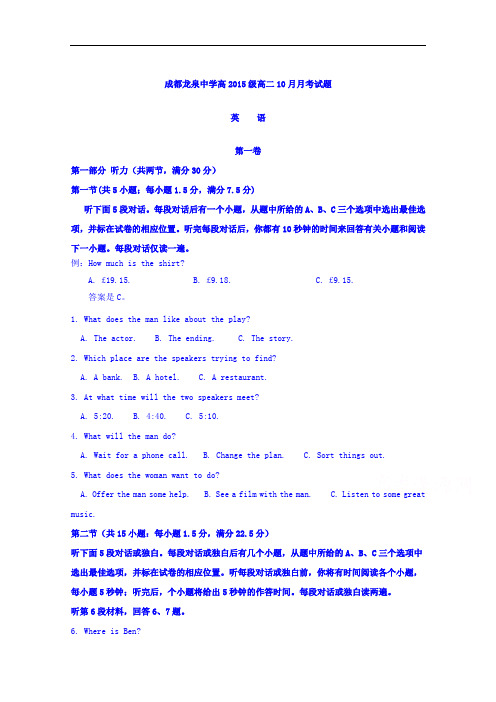
成都龙泉中学高2015级高二10月月考试题英语第一卷第一部分听力(共两节,满分30分)第一节(共5小题;每小题1.5分,满分7.5分)听下面5段对话。
每段对话后有一个小题,从题中所给的A、B、C三个选项中选出最佳选项,并标在试卷的相应位置。
听完每段对话后,你都有10秒钟的时间来回答有关小题和阅读下一小题。
每段对话仅读一遍。
例:How much is the shirt?A. £19.15.B. £9.18.C. £9.15.答案是C。
1. What does the man like about the play?A. The actor.B. The ending.C. The story.2. Which place are the speakers trying to find?A. A bank.B. A hotel.C. A restaurant.3. At what time will the two speakers meet?A. 5:20.B. 4:40.C. 5:10.4. What will the man do?A. Wait for a phone call.B. Change the plan.C. Sort things out.5. What does the woman want to do?A. Offer the man some help.B. See a film with the man.C. Listen to some great music.第二节(共15小题:每小题1.5分,满分22.5分)听下面5段对话或独白。
每段对话或独白后有几个小题,从题中所给的A、B、C三个选项中选出最佳选项,并标在试卷的相应位置。
听每段对话或独白前,你将有时间阅读各个小题,每小题5秒钟;听完后,个小题将给出5秒钟的作答时间。
每段对话或独白读两遍。
四川省成都市2017_2018学年高二英语10月月考试题
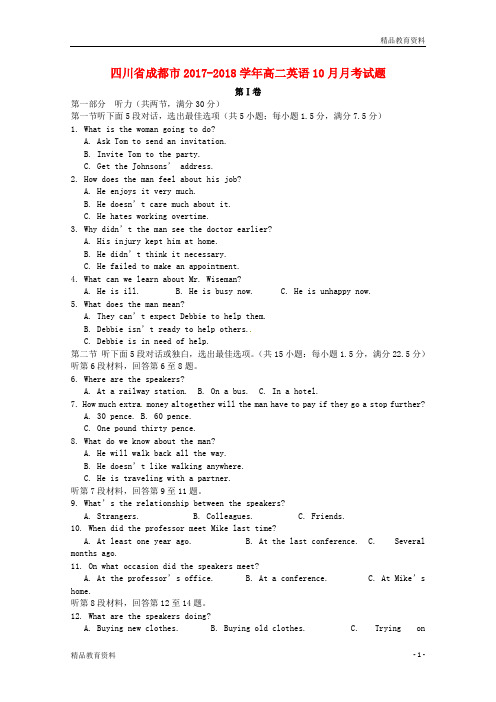
四川省成都市2017-2018学年高二英语10月月考试题第Ⅰ卷第一部分听力(共两节,满分30分)第一节听下面5段对话,选出最佳选项(共5小题;每小题1.5分,满分7.5分)1. What is the woman going to do?A. Ask Tom to send an invitation.B. Invite Tom to the party.C. Get the Johnsons’ address.2. How does the man feel about his job?A. He enjoys it very much.B. He doesn’t care much about it.C. He hates working overtime.3. Why didn’t the man see the doctor earlier?A. His injury kept him at home.B. He didn’t think it necessary.C. He failed to make an appointment.4. What can we learn about Mr. Wiseman?A. He is ill.B. He is busy now.C. He is unhappy now.5. What does the man mean?A. They can’t expect Debbie to help them.B. Debbie isn’t ready to help others.C. Debbie is in need of help.第二节听下面5段对话或独白,选出最佳选项。
(共15小题:每小题1.5分,满分22.5分)听第6段材料,回答第6至8题。
6. Where are the speakers?A. At a railway station.B. On a bus.C. In a hotel.7. How much extra money altogether will the man have to pay if they go a stop further?A. 30 pence.B. 60 pence.C. One pound thirty pence.8. What do we know about the man?A. He will walk back all the way.B. He doesn’t like walking anywhere.C. He is traveling with a partner.听第7段材料,回答第9至11题。
2016-2017学年高二英语10月月考试题
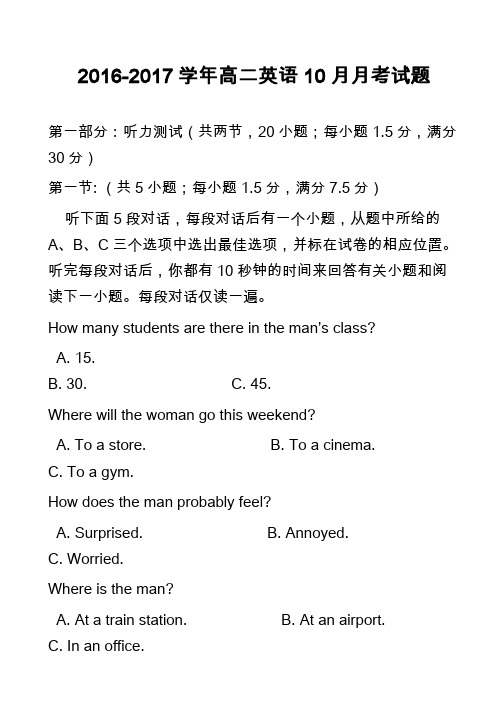
2016-2017学年高二英语10月月考试题第一部分:听力测试(共两节,20小题;每小题1.5分,满分30分)第一节: (共5小题;每小题1.5分,满分7.5分)听下面5段对话,每段对话后有一个小题,从题中所给的A、B、C三个选项中选出最佳选项,并标在试卷的相应位置。
听完每段对话后,你都有10秒钟的时间来回答有关小题和阅读下一小题。
每段对话仅读一遍。
How many students are there in the man’s class?A. 15.B. 30.C. 45.Where will the woman go this weekend?A. To a store.B. To a cinema.C. To a gym.How does the man probably feel?A. Surprised.B. Annoyed.C. Worried.Where is the man?A. At a train station.B. At an airport.C. In an office.What does the man mean?A. He wants to eat in the restaurant.B. Th e restaurant is fine but dark.C. He doesn’t like the restaurant.第二节:(共15小题;每小题1.5分,满分22.5分)听下面5段对话或独白。
每段对话或独白后有几个小题,从题中所给的A、B、C三个选项中选出最佳选项,并标在试卷的相应位置。
听每段对话前,你将有时间阅读各个小题,每小题5秒钟;听完后,各小题将给出5秒钟的作答时间。
每段对话读两遍。
听第6段材料,回答第6至7题。
What is Greta Carson probably doing?A. Having a meeting.B. Having a Christmas party.C. Having lunch.What will the woman probably do next?A. Mail a greeting card.B. Sign a paper.C. Call Greta Carson.听第7段材料,回答第8至9题。
四川省2016-2017学年高二10月月考英语试题Word版含答案
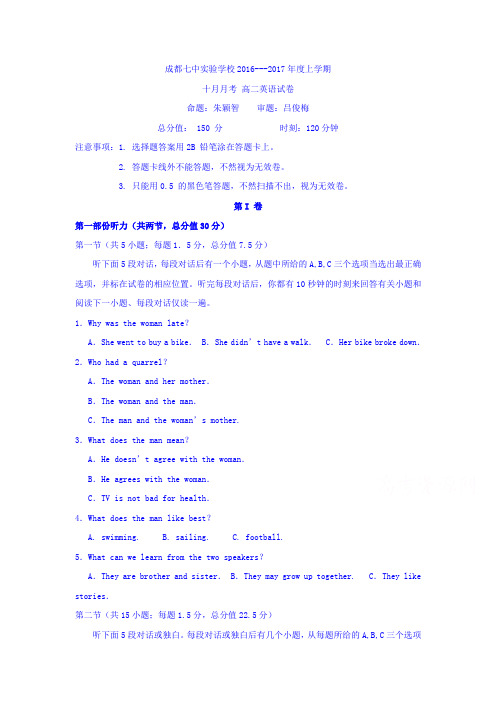
成都七中实验学校2016---2017年度上学期十月月考高二英语试卷命题:朱颖智审题:吕俊梅总分值: 150 分时刻:120分钟注意事项:1. 选择题答案用2B 铅笔涂在答题卡上。
2. 答题卡线外不能答题,不然视为无效卷。
3. 只能用0.5 的黑色笔答题,不然扫描不出,视为无效卷。
第I 卷第一部份听力(共两节,总分值30分)第一节(共5小题;每题1.5分,总分值7.5分)听下面5段对话,每段对话后有一个小题,从题中所给的A,B,C三个选项当选出最正确选项,并标在试卷的相应位置。
听完每段对话后,你都有10秒钟的时刻来回答有关小题和阅读下一小题、每段对话仅读一遍。
1.Why was the woman late?A.She went to buy a bike. B.She didn’t have a walk. C.Her bike broke down.2.Who had a quarrel?A.The woman and her mother.B.The woman and the man.C.The man and the woman’s mother.3.What does the man mean?A.He doesn’t agree with the woman.B.He agrees with the woman.C.TV is not bad for health.4.What does the man like best?A. swimming.B. sailing.C. football.5.What can we learn from the two speakers?A.They are brother and sister. B.They may grow up together. C.They like stories.第二节(共15小题;每题1.5分,总分值22.5分)听下面5段对话或独白。
四川省成都市龙泉中学2016-2017学年高二10月月考数学(理)试题 含答案
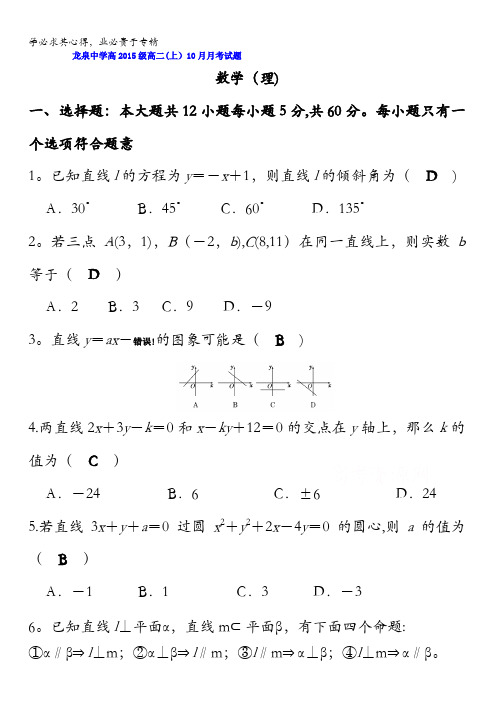
龙泉中学高2015级高二(上)10月月考试题数学(理)一、选择题:本大题共12小题每小题5分,共60分。
每小题只有一个选项符合题意1。
已知直线l的方程为y=-x+1,则直线l的倾斜角为(D) A.30° B.45°C.60° D.135°2。
若三点A(3,1),B(-2,b),C(8,11)在同一直线上,则实数b 等于(D)A.2 B.3 C.9 D.-93。
直线y=ax-错误!的图象可能是(B)4.两直线2x+3y-k=0和x-ky+12=0的交点在y轴上,那么k的值为(C)A.-24 B.6 C.±6 D.24 5.若直线3x+y+a=0过圆x2+y2+2x-4y=0的圆心,则a的值为(B)A.-1 B.1 C.3 D.-36。
已知直线l⊥平面α,直线m⊂平面β,有下面四个命题:①α∥β⇒l⊥m;②α⊥β⇒l∥m;③l∥m⇒α⊥β;④l⊥m⇒α∥β。
其中正确的命题有( C)A。
①②B。
②④ C.①③D。
③④7.若实数x,y满足不等式组错误!则该约束条件所围成的平面区域的面积是( C )A.3 B。
错误!C。
2 D。
2错误!8。
直线l经过点A(1,2),在x轴上的截距的取值范围是(-3,3),则其斜率的取值范围是( D )A.-1<k<错误!B.k〉1或k<错误!C.k〉错误!或k〈1 D.k>错误!或k<-19.直线x sin α-y+1=0的倾斜角的变化范围是( D )A。
错误!B.(0,π) C.错误! D.错误!∪错误!10。
已知:平面α⊥平面β,α∩β=l,在l上取线段AB=4,AC、BD 分别在平面α和平面β内,且AC⊥AB,DB⊥AB,AC=3,BD=12,则CD的长度( A )A.13 B。
错误!C.12错误!D.1511。
已知{(x,y)|(m+3)x+y=3m-4}∩{(x,y)|7x+(5—m)y-8=0}= ,则直线(m+3)x+y=3m+4与坐标轴围成的三角形面积是( B)A。
【试题】高二英语10月阶段性测试习题
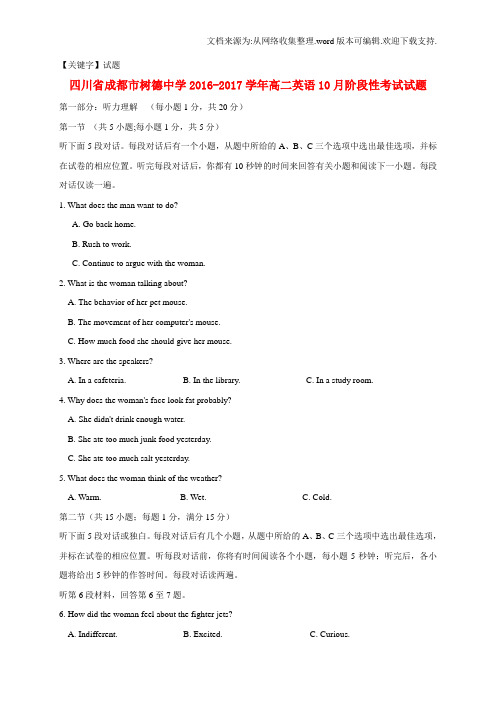
【关键字】试题四川省成都市树德中学2016-2017学年高二英语10月阶段性考试试题第一部分:听力理解(每小题1分,共20分)第一节(共5小题;每小题1分,共5分)听下面5段对话。
每段对话后有一个小题,从题中所给的A、B、C三个选项中选出最佳选项,并标在试卷的相应位置。
听完每段对话后,你都有10秒钟的时间来回答有关小题和阅读下一小题。
每段对话仅读一遍。
1. What does the man want to do?A. Go back home.B. Rush to work.C. Continue to argue with the woman.2. What is the woman talking about?A. The behavior of her pet mouse.B. The movement of her computer's mouse.C. How much food she should give her mouse.3. Where are the speakers?A. In a cafeteria.B. In the library.C. In a study room.4. Why does the woman's face look fat probably?A. She didn't drink enough water.B. She ate too much junk food yesterday.C. She ate too much salt yesterday.5. What does the woman think of the weather?A. Warm.B. Wet.C. Cold.第二节(共15小题;每题1分,满分15分)听下面5段对话或独白。
每段对话后有几个小题,从题中所给的A、B、C三个选项中选出最佳选项,并标在试卷的相应位置。
- 1、下载文档前请自行甄别文档内容的完整性,平台不提供额外的编辑、内容补充、找答案等附加服务。
- 2、"仅部分预览"的文档,不可在线预览部分如存在完整性等问题,可反馈申请退款(可完整预览的文档不适用该条件!)。
- 3、如文档侵犯您的权益,请联系客服反馈,我们会尽快为您处理(人工客服工作时间:9:00-18:30)。
成都龙泉中学高2015级高二10月月考试题英语第一卷第一部分听力(共两节,满分30分)第一节(共5小题;每小题1.5分,满分7.5分)听下面5段对话。
每段对话后有一个小题,从题中所给的A、B、C三个选项中选出最佳选项,并标在试卷的相应位置。
听完每段对话后,你都有10秒钟的时间来回答有关小题和阅读下一小题。
每段对话仅读一遍。
例:How much is the shirt?A. £19.15.B. £9.18.C. £9.15.答案是C。
1. What does the man like about the play?A. The actor.B. The ending.C. The story.2. Which place are the speakers trying to find?A. A bank.B. A hotel.C. A restaurant.3. At what time will the two speakers meet?A. 5:20.B. 4:40.C. 5:10.4. What will the man do?A. Wait for a phone call.B. Change the plan.C. Sort things out.5. What does the woman want to do?A. Offer the man some help.B. See a film with the man.C. Listen to some great music. 第二节(共15小题:每小题1.5分,满分22.5分)听下面5段对话或独白。
每段对话或独白后有几个小题,从题中所给的A、B、C三个选项中选出最佳选项,并标在试卷的相应位置。
听每段对话或独白前,你将有时间阅读各个小题,每小题5秒钟;听完后,个小题将给出5秒钟的作答时间。
每段对话或独白读两遍。
听第6段材料,回答6、7题。
6. Where is Ben?A. In the park.B. At school.C. In the kitchen.7. What will the children in the afternoon?A. Help set the table.B. Do their homework.C. Have a party.听第7段材料,回答第8、9题8. What are the two speakers talking about?A. A business trip.B. A Family holiday.C. A travel plan.9. Where did Rachel go?A. China.B. Italy.C. Spain.听第8段材料,回答第10至12题。
10.How did the woman get to know about third-hand smoke?A. From young smokers.B. From some smoking parents.C. From a newspaper article.11. Why does the man say that he should keep away from babies?A. He has just become a father.B. He is a smoker.C. He wears dirty clothes.12. What does the woman suggest smoking parents should do ?A. Reduce dangerous matter in cigarettes.B. Smoke only outside their houses.C. Stop smoking altogether.听第9段材料,回答第13至16题。
13. Where does Michelle Ray come from?A. A small town.B. A middle-sized city.C. A big city.14. Which place would Michelle Ray take her visitors to for shopping?A. The Zen GardenB. The Red River area.C. The Highlands.15. What does Michelle Ray do for complete quiet?A. Read at home.B. Study in a library.C. Go camping.16. What are the speakers talking about in general?A. Late-night shopping.B. Louisville.C. Asian food.听第10段材料,回答第17至20题。
17. Why do some people say they never have dreams according to Dr Garfield?A. They have no bad experiences.B. They don't want to tell the truth.C. They forget about their dreams.18. Why did Davis stop having dreams?A. He was too sad about his brother's deathB. He got a serious heart attack.C. He was frightened by a terrible dream.19. What is Dr Garfield s opinion about dreaming?A. It prevents the mind from working.B. It makes things worse.C. It is very useful.20. Why do some people turn off their dreams completely?A. To sleep better.B. To stay away from their problems.C. To recover from illnesses.第二部分:阅读理解(共2节,满分40分)第一节:阅读下列短文,从每题所给的四个选项(A、B、C和D)中,选出最佳选项,并在答题卡上将该项涂黑。
(共15小题;每小题2分,满分30分)AI don’t know how I became a writer, but I think it was because of a certain force in me that had to write and that finally burst through and found a channel. My people were of the working class of people. My father, a stone-cutter, was a man with a great respect and veneration(崇敬) for literature. He had a tremendous memory, and he loved poetry, and the poetry that he loved best was naturally of the rhetorical kind that such a man would like. Nevertheless it was good poetry, Hamlet’s Soliloquy, Macbeth, Mark Antony’s “Funeral Oration”, Grey’s “Elegy”, and all the rest of it. I heard it all as a child; I memorized and learned it all.He sent me to college to the state university. The desire to write, which had been strong during all my days in high school, grew stronger still. I was editor of the college paper, the college magazine, etc. , and in my last year or two I was a member of a course in playwriting which had just been established there. I wrote several little one-act plays, still thinking I would become a lawyer or a newspaper man, never daring to believe I could seriously become a writer. Then I went to Harvard, wrote some more plays there, became obsessed with(着迷于)the idea that I had to be a playwright, left Harvard, had my plays rejected, and finally in the autumn of 1926, how, why, or in what manner I have never exactly been able to determine. But probably because the force in me that had to write at length sought out its channel, I began to write my first book in London, I was living all alone at that time. I had two rooms-a bedroom and a sitting room-in a litter square in Chelsea in which all the houses had that familiar, smoked brick and cream-yellow-plaster look.21.We may conclude, in regard to the author’s development as a writer, that his father _________.A.made an important contributionB.insisted that he choose writing as a careerC. opposed his becoming a writerD.insisted that he read Hamlet in order to learn how to be a writer22. The author believes that he became a writer mostly because of _________.A. his special talentB. his father's teaching and encouragementC.his study at HarvardD. a hidden urge within him23. What can we learn about the author’s life in the autumn of 1926?A. He left Harvard and got married.B. He couldn’t make up his mind what to do .C. He started his dream as a writer.D.He began to think seriously what to do.BA home school is a school in which parents educate their children at home instead of sending them out to a public or private school. Home schooling is legal throughout Europe, Australia, New Zealand, North America, Hong Kong, and South Africa. Home schooling is most popular in Canada, France, the United Kingdom, and the United States. Home schooling is legally accepted in all 50 states of the US, but each state has its own laws about it. Currently, it is estimated that over one million families teach their children at home. Most of these families include a breadwinner and a stay-at-home parent who does most of the teaching, although there are single parent families and double career families.Home schooling education models range from unschooling to traditional classroom schooling. Unschooling is based on interest-based learning in which the child expresses interest in a particular subject, and the parents take steps to provide the materials for that subject.In some places, the home school group shares in hiring a professional teacher to teach a particular subject. The group may also arrange field trips and sports activities with local private schools. These activities are intended to provide social skills for the students.Home school families take advantage of technology and the Internet to supplement (补充) traditional teaching. Some home school families enroll (注册) their children in an online school or course as a supplement to their own teaching.Some home school families teach their children through high school graduation. Others teach their children until they feel they are mature (成熟) enough to live independently.In America colleges do recognize a home school diploma (文凭) , but most are more interested in high school transcripts (成绩报告单) and SAT and ACT scores. There are currently over 800 colleges that accept home-schooled graduates including Harvard, Yale, and Stanford.24.A home school is a school where __________.A. parents provide social skills for their childrenB. children needn’t take any testsC. parents teach their children at homeD. children can go home every day25.In the education model of unschooling,_____________.A. children are taught in traditional waysB. children don’t need any textbooksC. special attention is paid to children’s interestD. everything is decided by children’s parents26.We can know from the passage that_____________.A. home schooling is only popular in developed countriesB.children in a home school have no contacts with other studentsC.a home school diploma is not accepted by colleges in AmericaD.some children in a home school also take courses online27.Famous universities like Harvard, Yale, and Stanford ______________.A. are only interested in accepting public school graduatesB. also take in students with a home school diplomaC.never enroll home-schooled graduatesD. also provide home school educationCI was in my third year of teaching writing at Ralph High School in New York, when one of my students,15-year-old Mikey,gave me a note from his mother.It explained his absence from class the day before:“Dear Mr. McCort,Mikey’s grandmother,who is eighty years of age,fell down the stairs from too much coffee and I kept Mikey at home to take care of her and his baby sister so I couldn’t go to my job. Please excuse Mikey and he’ll do his best in the future.P.S.His grandmother is OK.”I had seen Mikey writing the note at his desk.I said nothing.Most parental-excuse note, I received were penned by my students.The writers of those notes didn’t realize that honest excuse notes were usually dull: “Peter was late because the alarm clock didn’t go off.”The students always said it was hard putting 200 words together on any subject, but when they produced excuse notes, they were excellent.So I decided to give the first class to study the art of the excuse note.“Today I’d like you to write ‘An Excuse Note from Adam to God’ or ‘An Excuse Note from Eve to God’.”Heads went down.Pens raced across paper.They had to be asked to go to lunch by their friends.The next day everyone had excuse notes.Heated discussions followed.But suddenly I saw the headmaster at the door.He entered the classroom and walked up and down,looking at papers,and then said.“I’d like you to see me in my office.”My heart sank.When I stepped into his office,he came to shake my hand and said,“I just want to tell you that lesson, that ask, was great.Those kids were writing on the college level.Thank you.”28.We can inter that when Mikey was absent from the class, he wasA. somewhere enjoying himselfB. taking care of his baby sisterC. looking after his grandmotherD. studying the art of the excuse note29. How did the author usually find out his students’ parental-excuse notes were dishonest? A.They were written in dull words.B.They were more like stories than facts.C.He called their parents and found out the truth.D. The handwriting obviously looked like children’s.30.From the 5th paragraph we knowA.the kids were afraid of GodB.it was too difficult a task for the kidsC.the kids were very interested in the taskD. none of the kids had lunch that day31.Why did the author’s heart sink?A.He thought the headmaster would scold him.B. The heated discussions angered the headmaster.C. The students were not behaving themselves.D.The headmaster was looking at his students’ papers.DSomeday a stranger will read your e-mail without your permission or scan the Website you’ve visited,Or perhaps someone will casually glance through your credit card purchases or cell phone bills to find out your shopping preferences or calling habits.In fact, it’s likely that some of these things have already happened to you. Who would watch you without your permission? It might be a spouse, a girl friend, a marketing company, a boss, a cop or a criminal. Whoever it is, they will see you in a way you never intended to be seen — the 21st century replacement of being caught naked.Psychologists tell us boundaries are healthy, that it’s important to reveal yourself to friends, family and lovers in stages, at appropriate times. But few boundaries remain. The digital bread crumbs(碎屑) you leave everywhere make it easy for strangers to reconstruct who you are, where you are and what you like. In some cases, a simple Google search can reveal what you think. Like it or not, increasingly we live in a world where you simply cannot keep a secret.The key question is: Does that matter?For many Americans, the answer apparently is “no” .When opinion polls ask Americans about privacy, most say they are concerned about losing it. A survey found a strong bad feeling about privacy, with 60 percent of respondents saying they feel their privacy is “slipping away, and that bothers me” .But people say one thing and do another. Only a tiny part of Americans change any behaviors in an effort to preserve their privacy. Few people turn down a discount at tollbooths(收费站) to avoid using the EZ-Pass system that can track automobile movements.And few turn down supermarket loyalty cards. Privacy economist Alessandro Acquisti has run a series of tests that reveal people will give away personal information like Social Security numbers just to get their hands on a pitiful 50-cents-off coupon(优惠券).But privacy does matter —at least sometimes. It’s like health: When you have it, you don’t notice it. Only when it’s gone do you wish you’d done more to protect it.32. What does the author mean by saying “the 21st century replacement of being caught naked”?A. People’s personal information is easily accessed without their knowledge.B. In the 21st century people try every means to look into others’secrets.C. People tend to be more frank with each other in the information age.D. Criminals are easily caught on the spot with advanced technology.33.What would psychologists advise on the relationships between friends?A. Friends should open their hearts to each other.B. Friends should always be faithful to each other.C. There should be a distance even between friends.D. There should be fewer arguments between friends.34. Why does the author say “we live in a world where you simply cannot keep a secret”?A. Modern society has finally developed into an open society.B. People leave traces around when using modern technology.C. There are always people who are curious about others’ affairs.D. Many search engines benefit from giving away people's identities.35. What do most Americans do as for privacy protection?A. They change behaviors that might disclose their identity.B. They use various loyalty cards for business transactions(交易).C. They rely most and more on electronic devices.D. They talk a lot but hardly do anything about it.第二节:七选五Talkative kids can sometimes be a headache for parents, but the willingness to speak aloud and often is considered as a positive thing.___36_________. The benefits go far beyond that to grade school, secondary school, college and especially the workplace. The following is why talkative kids are more likely succeed when they grow up.____37_______.talkative kids aren’t going to be able to stay quiet for long. This can definitely become a problem, but if they’re able to learn when it is ok to talk and when it’s not, it can have big rewards. In a classroom, it can mean that they’re raising their hands a lot and contributing to discussions. Teachers usually need tricks and tips to get a discussion going, but not if one or two talkative kids are in the classroom.They have more to say. Most child couldn’t come up with enough to talk for 5 minutes.______38_____ .It shows that they have a lot of ideas. That thoughtfulness and sense of imagination will pay off when they need to.They have a lot of energy._____39________.Just think about all they could get done if they just put that energy to good use. If your child never stays quiet,that’s a problem. Help them find hobbies s that they can divert(转移) the energy towards something productive. They keep things interesting. Any parents of talkative kids can prove that they try to keep things interesting and often entertaining._____40________.In a world where even parenthood can be dull at times,it’s good to have something in your life that is going to keep surprising you,and talkative kids ate the most likely to shake things up.A They will participate moreB talkative kids are very energeticC But talkative kids can talk for hoursD They’ll have better communication skillsE Research shows that talkative kids do better in preschoolF It’s not always easy on the parent, but at least it never gets boringG When you ask more questions, they will naturally give more answers第三部分知识运用(共两节,45分)第一节:阅读下面短文,从短文后所给的A、B、C、D四个选项中,选出可以填入空白处的最佳选项,并在答题卡上将该项涂黑。
